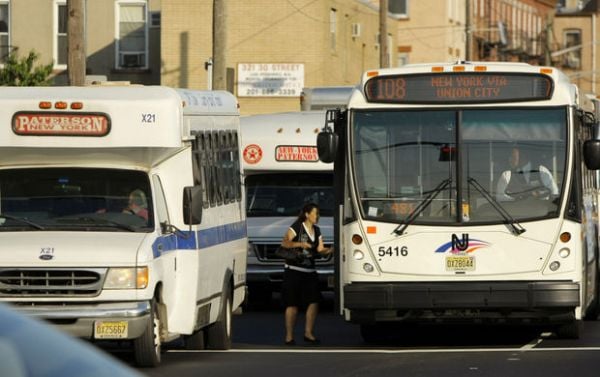A Fatal Accident Prompts New Jersey Minibuses to Self-Regulate

New Jersey’s jitney operators have been criticized for their reckless driving following the death of an 8-month-old girl.
In Sergio Garces’ opinion, New Jersey’s minibus drivers get a bad rap. Ever since July, when a crash involving one of the vans tragically killed an 8-month-old girl in West New York, the fleets of semi-informal mass-transit buses have come under fire for their lack of regulation and the recklessness of some of their operators. But Garces, who used to drive a Town Car before moving into the minibus business six years ago, says it could just as easily have been a limousine involved in last month’s fatal crash.
“It could have been a truck or a limousine, but unfortunately it was a minibus,” says Garces, “and now people say in the community, ‘All minibuses are bad.’”
As the de facto leader of the newly formed Association of Professional Interstate Conductors (APIC), Garces knows the importance of public perception of his industry. One of APIC’s goals is to improve this perception by organizing drivers and helping the industry self-regulate; the hope is that the changes will benefit both the riding public and the drivers themselves, and remove some of the stigma from an industry that many consider a lifeline. “Jersey City,” says Garces, citing one of the cities he drives in, “is one of the largest towns around here. There’s a big African population around here. The Spanish community is one of the largest. We provide service very late. We are there for them. We provide service to Jersey City at times when no one else wants to go there.”
He believes taming the industry through self-regulation is critical to keeping that service intact — one need only look to the Chinatown buses to see how concerns over safety can shut down a popular transportation option.
“We are trying to work together in order to see how we can teach our drivers not to commit any mistakes on the road and get them to provide efficient service to the community,” says Garces. Driver training programs are one part of this puzzle, but so is providing more protection to the drivers themselves. “There are many incidents when someone jumps on the bus and tries to rob the driver,” says Garces. “When someone jumps on the bus, it also risks the passengers’ lives. We have to improve the security on the buses.”
No easy task when those buses seem to multiply by the day — Garces says the unchecked proliferation of minibus companies in urban New Jersey is part of the problem. “The economy is not so good, and most immigrants, when they see all these buses around, think they can make a lot of money doing that. But we have to keep the number of buses low. It’s creating traffic, it’s creating pollution. We have to say, let’s support these people who are already trying to do something for everyone.”
To this end, APIC is working with police departments in New Jersey to bring order and security to the system. On August 22, the group is holding an open meeting with the chief of the West New York police force. And it’s pushing for security cameras on every bus to deter would-be robbers. Garces says these are the first steps toward creating a system that, while still informal, can operate more effectively. To Garces, shutting down New Jersey’s minibus system would have grave consequences.
“They cannot say tomorrow, ‘Let’s take out [the minibuses] because of one incident,” he says. “If they do, the whole community will suffer. So we have to get everyone together so we can get solutions.”









